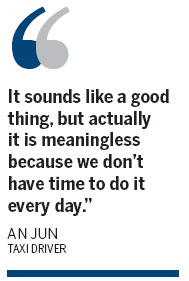
Exercises designed to boost health of workers who sit for long periods
Three work-break exercises, which have been specially designed for taxi drivers, office workers and construction workers, were released on Monday.
Authorities try to develop appropriate work-break exercises for workers in different industries to help them get healthy, said Yu Junsheng, spokesman for the Beijing Federation of Trade Unions.
Workers in the three industries are the first to be given exercises because they need them more, Yu said.
Professors from Beijing Sports University designed the exercises, a video of which can be downloaded from some websites, including xinhuanet.com and rbc.cn. Copies will also be sent to enterprises in the three industries.
Office workers sit at desks for a long time and suffer heavy mental stress, said Ma Hongtao, dean of the Beijing Sports University's gymnastics college, so wrist action and raps on the head were added to their exercises.

Ma said construction workers work long hours in dangerous environments, so their exercises aim to improve their balance and add some interest to their days.
For taxi drivers who work in a limited space and do not have regular meals, exercises were divided into two parts - inside and outside vehicles with stretching exercises included to help ease fatigue.
All the exercises last for about four minutes.
However, some workers do not care about the exercises because they have no time.
"It sounds like a good thing, but actually it is meaningless because we don't have time to do it every day," said An Jun, a 47-year-old taxi driver. He said even when he stops at traffic lights, he only get about a minute's rest.
Although most taxi drivers suffer from excessive weight around the waist and cervical vertebra problems, they would not exercise much after a day's work because they are so tired, he said.
Wang Guochun, a migrant worker on a construction site in Beijing, agrees with An.
"We would like to sleep rather than exercise when we have a break," Wang said. "Nobody has the time or the energy to do exercises after 14 hours working on the site."
Work-break exercises in Beijing began in 1951 but were suspended in 2007. Enterprises in the city decided to encourage workers to do work-break exercises in August 2010 as part of the government's 10-year plan to improve residents' health.
According to the plan, enterprises should guarantee workers exercise at least once a day. The most common exercise are radio gymnastic exercises.
Statistics from the Beijing employee sports association shows that until the first quarter of 2011, the work-break exercises were taken in 56 percent of enterprises in the city and 95 percent of institutions offer work-break exercise time for workers. Among privately owned and foreign enterprises, the percentage is about 37 percent.
To make work-break exercises more popular in private and foreign enterprises, Wu Mengqun, secretary general of the association, said they will organize an exercise competition in early July, in which more than 2,000 employees in the enterprises will participate.
Liu Yujie contributed to this story.
China Daily
(China Daily 05/31/2011)